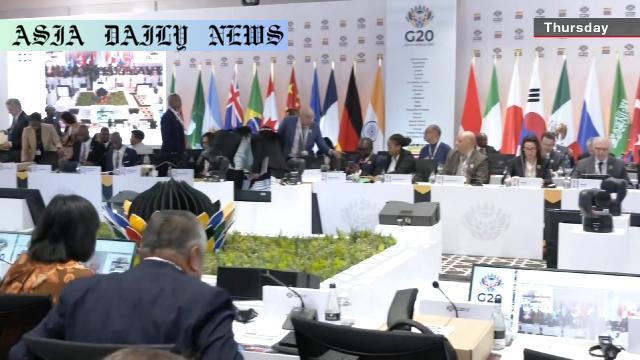Tariffs: Finance chiefs discuss potential global economic uncertainties and challenges stemming from US trade policies.
Concerns raised by G20 leaders over the economic impact of US tariffs.
Finance chiefs call for free and open multilateral trade systems.
The global economic outlook remains uncertain due to US policies.
Ongoing discussions focus on sustainable growth, alongside trade issues.

Concerns Raised Over US Tariffs at G20 Summit
The first day of the G20 finance chiefs’ meeting in South Africa has been marked by intensive discussions on global economic issues, with a central focus on the tariffs imposed by the United States. Finance ministers and central-bank governors from the Group of 20 economies expressed apprehension over the potential adverse impacts of these tariffs on the global economy. Some leaders argued that the policies might fail to resolve trade imbalances, thereby complicating the existing framework of international trade.
Japanese Finance Minister Kato Katsunobu voiced Japan’s concerns, emphasizing the importance of maintaining a free and open multilateral trade system. He underscored the need for a cooperative and inclusive approach to global economic growth, warning against the risks of unpredictability in financial markets caused by unilateral tariff policies. Many other leaders echoed similar sentiments, highlighting that such measures could amplify economic uncertainties globally.
While tariffs dominated discussions, the finance chiefs are slated to deliberate on a more comprehensive agenda, including sustainable growth in Africa and other pressing global economic issues, on the second day of the summit. These discussions aim to culminate in a unified declaration addressing shared objectives and concerns.
Transporting Global Trade Dynamics into Perspective
Analyzing the longer-term implications of US tariff measures, many officials indicated that such policies could potentially disrupt established trade relationships. Organizations dependent on multi-national partnerships may face operational challenges due to increased costs and reduced market access. These added pressures could trickle down to consumers, resulting in higher prices for goods and services.
A recurring theme throughout the summit has been the necessity to foster dialogue among nations. Many participants stressed that collaborative trade policies, rather than protectionist measures, would better help address trade deficits and economic disparities. Policies promoting economic inclusivity and advancing international cooperation stood out as key priorities highlighted by various financial delegates.
Sustainable Growth in Africa and G20’s Broader Commitments
Beyond trade concerns, the G20 finance chiefs are also looking to address sustainable economic growth, especially in regions like Africa, where development struggles persist. Such discussions are integral, given the continent’s significant potential for economic expansion and its critical role in the global market. Tackling urbanization, technological adoption, and infrastructure development remains pivotal in achieving sustainable growth objectives.
The session’s outcomes are expected to formalize a robust roadmap, aiming to balance global economic growth with equitable resource distribution. By focusing on regional developments alongside global challenges, G20 leaders are tasked with demonstrating a commitment to fostering stability amidst complex dynamics.
Commentary
The Growing Concerns of Protectionist Policies
The discussions at the G20 summit clearly highlight the sense of unease over the growing trend of protectionism, with US tariffs taking center stage. One of the most significant talking points is how these measures, intended to address immediate strategic objectives like reducing trade imbalances, can have broader ripple effects on the global economy. While nations understand the need for fiscal autonomy, policies like these risk setting precedents that could fragment decades of effort towards open global trade.
What is especially worrisome is the unpredictability regarding how such tariffs will shape economic relationships. As emphasized by several finance chiefs, including Japan’s Kato Katsunobu, the aftermath extends beyond governments and impacts businesses and consumers. Higher tariffs often translate to higher product costs, which inevitably trickle down and burden ordinary citizens. This raises the question: are the supposed gains from tariffs sustainable enough to offset the associated global costs?
Time for Collaborative Trade Policies
Instead of focusing on zero-sum games, G20 nations must prioritize multilateral cooperation. Collaborative approaches can yield innovative solutions to address trade imbalances and global economic disparities. The G20 itself serves as a platform for such productive discussions. However, it requires mutual trust and an openness to engage constructively—qualities that can sometimes waver when national interests overshadow collective goals.
Moving Towards Equitable Economic Growth
Lastly, it is commendable that the G20 is not solely fixated on trade but is also addressing long-term growth opportunities, like those in Africa. By channeling financial resources and expertise into underdeveloped regions, the global community can ensure not just economic growth but equity and resilience. However, these priorities must not be overshadowed by immediate political and economic challenges, such as the tariff disputes. There lies an opportunity for G20 nations to reaffirm their collective commitment to creating a balanced global economy for future generations.


